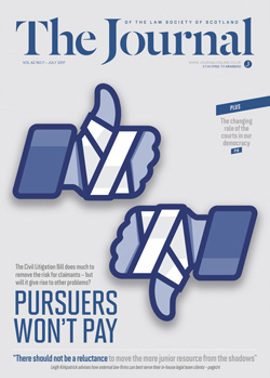Taxman scores winner in Rangers contest

The UK Supreme Court has rejected an appeal from the administrators of Rangers 2012 plc (in liquidation) (“RFC 2012”) against the ruling of the Inner House of the Court of Session. The decision brings to a close the longrunning dispute over the football club’s use of employee benefit trusts (“EBTs”) to remunerate players, managers and directors between 2001 and 2009, by ruling that the payments made were earnings and therefore subject to income tax and national insurance contributions (“NICs”).
Background
The case relates to RFC 2012’s use of EBTs as a vehicle for tax avoidance by making payments to their employees without incurring any income tax or NICs on the payments. Payments were made by Murray International Holdings (“MIH”), the then owner of Rangers, and other group companies. RFC 2012 went into liquidation in 2012, and the current Rangers Football Club is not a party to the case.
MIH and other group companies paid amounts into an EBT. RFC 2012 then instructed the EBT trustee to make payments to a sub-trust controlled by the employee receiving the payment. This sub-trust would hold funds for the beneficiaries of the sub-trust, being specified members of the relevant employee’s family.
Between 2001 and 2009, payments in excess of £50 million were made to 81 players and 27 other executives of RFC 2012.
In 2012, the First-tier Tax Tribunal (FTT) found in favour of RFC 2012 and the other group companies. It found that the payments could not be classed as “emoluments” or “earnings” under the income tax legislation in force at the time, because the players and other employees had no “absolute legal entitlement” to the money and the trust could demand repayment at any time. Its decision was upheld by the Upper Tribunal. The Court of Session disagreed. The money was earnings derived from employment, and it made no difference that it was redirected to a third party at the request of the employee.
Purposive approach
The Supreme Court upheld the decision of the Court of Session. In its judgment, the court backed a “purposive” approach to the interpretation of the taxing provisions. Although there was “no suggestion that any part of the transaction, which comprised the tax avoidance scheme, was a sham”, that was “not the point”, Lord Hodge said.
“Parliament in enacting legislation for the taxation of emoluments or earnings from employment has sought to tax remuneration paid in money or money’s worth,” he stated, adding that no persuasive rationale was advanced for excluding remuneration in the form of money which the employee agreed should be paid to a third party.
“The scheme was designed to give each footballer access without delay to the money paid into the [EBT], if he so wished, and to provide that the money, if then extant, would ultimately pass to the member or members of his family whom he nominated. Having regard to the purpose of the relevant provisions, I consider the sums paid to the trustee of the [EBT] for a footballer constituted the footballer’s emoluments or earnings.”Although, as found by the FTT, there was a chance that the trustee might refuse to loan funds from the trust to a particular footballer, Lord Hodge said that this “does not alter the nature of the payments to the trustee”.
He continued: “In applying a purposive interpretation of a taxing provision in the context of a tax avoidance scheme it is legitimate to look to the composite effect of the scheme as it was intended to operate... The footballers, when accepting the offer of higher net remuneration through the trust scheme... were prepared to take the risk that the scheme might not operate as planned.”
Implications
The judgment represents a major victory for HMRC, who will now be able to pursue a number of other employers who have sought to take advantage of similar tax avoidance schemes, and has the potential to result in a substantial windfall for the tax authorities. It is expected that HMRC will cite the case extensively in its continued war against tax avoidance, in particular the Supreme Court’s backing of a purposive approach to interpretation of the legislation.
HMRC may try to use the decision not only in EBT structures (in respect of which many of the tax advantages were removed in 2011 with the introduction of the disguised remuneration regime), but also to attack employer financed retirement benefits schemes (EFRBS) and possibly even certain employer/contractor loan arrangements.
In this issue
- Family law: still scope for reform
- People's court
- The importance of lawyers in a democratic society
- Thy will be done
- Children's rights and physical punishment
- Pension sharing and professional negligence
- Reading for pleasure
- Opinion: Bruce Adamson
- Book reviews
- Profile
- President's column
- People on the move
- 400 years – still innovating
- Litigation: a bill to settle
- Access to justice: the small print
- Benefits of devolution
- The changing role of the courts in our democracy
- Core values
- The will bank opportunity
- Deep and meaningful
- The fall and rise of interrogatories
- To act or not to act?
- Immigration issues: more red tape
- Taxman scores winner in Rangers contest
- EIA: the regimes change
- Scottish Solicitors' Discipline Tribunal
- Practitioners or salesmen?
- Where the buck stops
- Law reform roundup
- Cyber basics for lawyers
- Practice points from missives review
- Money laundering update: new regulations in force
- Courts raise the stakes
- May: the force be not with you
- Conference success
- SYLA: 2016-17 in focus
- Ask Ash






